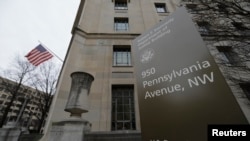Five Pakistani businessmen have been indicted in the United States, accused of operating an international network of front companies to export U.S.-origin products to Pakistan for use in that country’s nuclear program, the Justice Department announced Wednesday.
The men transported the goods to Pakistan’s Advanced Engineering Research Organization and the Pakistan Atomic Energy Commission without export licenses, according to the indictment. It identified 38 illegal nuclear-related exports from 29 U.S. companies to Pakistan between September 2014 and October 2019.
The defendants tried to hide the destinations of the exports in Pakistan by using their network of front companies as the purported importers and end users, according to the indictment.
The men, who live in Pakistan, Canada, Hong Kong and England, were charged in federal court in New Hampshire, where three of the U.S. companies are based, with conspiracy to violate U.S. export control laws. None of the U.S. companies was found to be complicit in the unlawful exports.
Identities
The defendants were identified as Muhammad Kamran Wali, 41, of Pakistan; Muhammad Ahsan Wali, 48, and Haji Wali Muhammad Sheikh, 82, both of Mississauga, Ontario, Canada; Ashraf Khan Muhammad of Hong Kong; and Ahmed Waheed, 52, of Ilford, Essex, United Kingdom. None of them has been arrested, although arrest warrants are pending.
The two Pakistani entities – AERO and PAEC – are on the U.S. Commerce Department’s list of companies required to hold export licenses because their activities are deemed contrary to U.S. national security or foreign policy interests.
PAEC was added to the list in 1998 after Pakistan carried out a series of underground nuclear tests in response to Indian nuclear tests. AERO was included in 2014 after the U.S. found that it had used intermediaries and front companies to acquire goods for Pakistan’s cruise missile and strategic unmanned aerial vehicle programs, the Justice Department said.
“The defendants smuggled U.S.-origin goods to entities that have been designated for years as threats to U.S. national security for their ties to Pakistan’s weapons programs,” John Demers, assistant attorney general for national security, said in a statement.
Example for businesses
“This indictment puts the world on notice not to do business with these defendants and demonstrates our commitment to holding them accountable,” Demers said. “It also stands as an example of the kind of deceptive behavior U.S. businesses need to watch out for in designing appropriate export control and sanctions compliance programs.”
The indictment stemmed from counternuclear proliferation efforts by investigative agencies within the departments of Justice, Commerce, Homeland Security and Defense. Jason Molina, acting special agent in charge, Homeland Security Investigations, said the agency’s counterproliferation group proactively conducts investigations into violations of U.S. export-import licensing because of the threat they can pose to U.S. national security.
“The alleged behavior of these five individuals presented more than a violation of U.S. export laws, it posed a potential threat to the national security interests of the United States and to the delicate balance of power among nations within the region,” Molina said.
Pakistan is one of nine nuclear powers in the world, with an estimated 150 to 160 warheads in its nuclear arsenal, according to the Arms Control Association.
